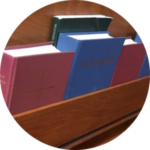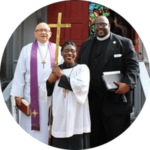Screening and Discernment Update from the Bishop Search Committee
The selection of a new bishop is a process of mutual discernment for the diocese and those feeling called to this ministry. The diocesan profile has been released, applications are being submitted, and the application deadline is May 30, 2025. Next, the Search Committee will interview candidates for about four weeks using various screening methods, including profile searches, background checks, and Zoom. This screening process will enable the Search Committee to fulfill its obligation to ensure the church’s safety by conducting a thorough background check.
A Constitution and Canons Look at the Election of the Bishop
The Constitution, Canons, and Rules of Order govern the Diocese of East Carolina and the Episcopal Church. The Standing Committee is charged with “oversight of, and responsibility for, any search, nomination, transition, and election processes.” (TEC Canon III.11.1). A majority of the Standing Committees and a majority of all the bishops exercising jurisdiction must consent to the election within one hundred and twenty days from the date of notification to them by the Presiding Bishop of the election ….” (TEC Canon III.11.4)
In the election of a Bishop, the Convention shall vote by ballot, by Orders, and by Parishes. A majority of all Clergy entitled to seats in the Convention (see Art. VII, Sec. 1), and a majority of the lay delegates voting by parishes (churches) shall be required for an election.
Each parish or mission church in the Diocese is entitled to representation by lay delegates in proportion to its confirmed communicants in good standing who are sixteen years of age or older. The lay delegates for each church are to be elected according to Const. Art. IV. When the Ecclesiastical Authority recognizes an Episcopal College or University Campus Ministry as a community of faith, such Campus Ministry may select a student lay delegate to represent it at the Annual Convention. The student lay delegate will be an adult confirmed communicant in good standing in this Church and chosen by the Campus Ministry from among its members. Each church will be entitled to select one alternate lay delegate for every lay delegate to which it is entitled, and the alternate delegates shall be elected in the same manner as delegates. Lay delegates must be confirmed communicants in good standing 16 years of age or older. (DEC Art. IV.3)
Voting by Orders and Parishes is as follows: First, there has to be a quorum to vote. A quorum to vote by Orders and Parishes is a majority of all the clergy entitled to seat and vote (excluding non-parochial clergy) and the presence of representatives from two-thirds of the Parishes entitled to representation and vote. Second, the voting will be by roll call of the clergy, with each clerical member voting with the tellers by ballot. The roll of the Parishes will then be called, with one lay delegate voting the parish ballots with the tellers. Delegates must be on the floor of the convention at the time the vote is being taken.





